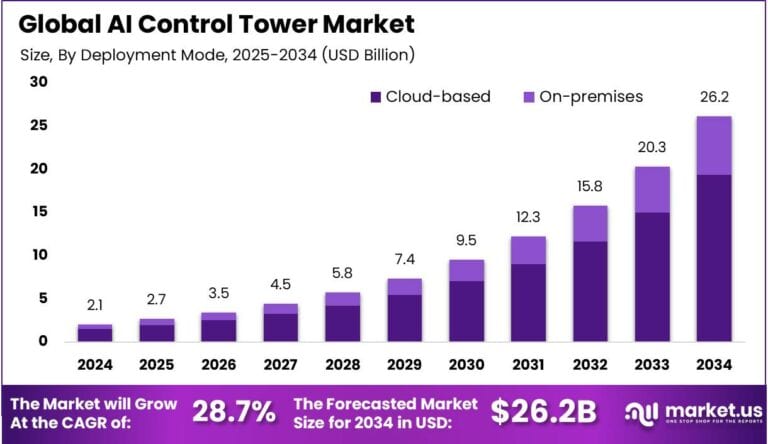Table of Contents
Introduction
The global AI control tower market is expected to surge from USD 2.1 billion in 2024 to USD 26.2 billion by 2034, at a CAGR of 28.7%. In 2024, North America dominated with a 38% market share, generating USD 0.7 billion in revenue. The U.S. market, valued at USD 0.7 billion, is projected to grow at a CAGR of 26.3%. The rapid adoption of AI for enhanced supply chain visibility, predictive analytics, and real-time decision-making is driving growth, alongside increasing complexity in global logistics and demand for operational efficiency.

How Tariffs Are Impacting the Economy
Tariffs on AI-related hardware components, such as sensors, processors, and networking devices, increase production costs, leading to higher prices for businesses integrating AI control towers. These cost inflations can slow adoption rates and reduce investment in AI infrastructure.
➤ Discover how our research uncovers business opportunities @ https://market.us/report/ai-control-tower-market/free-sample/
(Use corporate mail ID for quicker response)
Supply chain disruptions due to tariffs force companies to diversify sourcing or relocate production, incurring higher expenses and longer lead times. Retaliatory tariffs escalate global trade tensions, adding uncertainty that hampers innovation and cross-border collaboration. Such challenges collectively constrain economic growth and digital transformation efforts, particularly in industries relying heavily on AI-driven supply chain optimization.

Impact on Global Businesses
Businesses deploying AI control towers face increased capital and operational expenditures due to tariffs on critical components and software licenses. Supply chain realignment adds complexity and demands enhanced risk management. Industries such as manufacturing, retail, and logistics experience delays in AI implementation, impacting efficiency and customer satisfaction. Emerging markets dependent on imports encounter affordability barriers, slowing adoption. Companies must focus on cost optimization, supply chain resilience, and cloud-based solutions to sustain growth. Sector-specific impacts include regulatory compliance challenges and fluctuating demand influenced by trade policies.
Strategies for Businesses
Organizations mitigate tariff impacts by diversifying suppliers and investing in regional manufacturing to minimize import reliance. Embracing cloud-based AI platforms reduces hardware dependency and increases scalability. Predictive analytics enable proactive tariff risk forecasting and inventory optimization. Strategic alliances with technology vendors and regional partners strengthen supply chains. Automation and process innovation lower operational costs. Active engagement in policy advocacy aims to shape favorable trade environments. Flexibility, innovation, and collaboration are critical for navigating tariff-related disruptions successfully.
➤ Get full PDF access here @ https://market.us/purchase-report/?report_id=148994
Key Takeaways
- AI control tower market projected to grow at 28.7% CAGR through 2034
- Tariffs increase costs and disrupt supply chains for AI components
- Implementation delays impact supply chain efficiency and customer experience
- Supply diversification and cloud adoption mitigate tariff challenges
- Predictive analytics supports proactive tariff risk management
Analyst Viewpoint
The AI control tower market is poised for rapid expansion fueled by demand for real-time supply chain visibility and automation. While tariffs present cost and supply challenges, they accelerate innovation in cloud adoption and supplier diversification. Market players prioritize flexible, scalable solutions and strategic partnerships. The outlook remains strongly positive as digital transformation drives continued investment and adoption globally.
➤ Discover More Trending Research
- Computer Vision Market
- ERP Software Market
- Field-Programmable Gate Array (FPGA) Market
- Video Conferencing Market
Regional Analysis
North America leads with a 38% market share in 2024, driven by advanced digital infrastructure and significant investments in AI technologies. The U.S. dominates regional growth with widespread adoption in manufacturing and logistics. Europe follows with steady growth backed by regulatory support and innovation hubs. Asia-Pacific shows rapid potential due to expanding industrialization and supply chain complexity. Regional disparities reflect differences in technology maturity, policy frameworks, and investment capacity.
Business Opportunities
Expanding demand for AI-powered supply chain optimization opens opportunities in manufacturing, retail, and logistics sectors. Cloud-based and modular AI control tower solutions cater to scalability and cost efficiency. Emerging markets offer growth potential through infrastructure development and digital transformation initiatives. Collaborations between technology providers, logistics firms, and enterprises facilitate tailored solutions. Additionally, integration with IoT and predictive analytics enhances value propositions, driving market adoption.
Key Segmentation
Component
- Hardware
- Software
- Services
Deployment Mode
- Cloud-based
- On-premises
Application
- Supply Chain Visibility
- Predictive Analytics
- Inventory Management
- Risk Management
End User
- Manufacturing
- Retail
- Logistics and Transportation
- Others
Key Player Analysis
Leading companies focus on delivering scalable, AI-driven platforms with advanced analytics and real-time monitoring capabilities. Investments in R&D enhance predictive accuracy and interoperability. Strategic partnerships with industry stakeholders and cloud providers expand market reach. Emphasis on cybersecurity, compliance, and user experience strengthens competitive positioning. Regional expansions through localized solutions support growth. Continuous innovation and customer-centric development sustain leadership in a rapidly evolving market.
Recent Developments
In 2025, major providers launched enhanced AI-powered predictive analytics modules and cloud-native control tower platforms. Strategic alliances with logistics firms accelerated adoption. Increased focus on cybersecurity improved platform robustness.
Conclusion
The AI control tower market is set for robust growth driven by supply chain complexity and digital transformation. Tariff challenges spur innovation and supply chain diversification. Continued investment in cloud and AI technologies will sustain market momentum.
Discuss your needs with our analyst
Please share your requirements with more details so our analyst can check if they can solve your problem(s)



